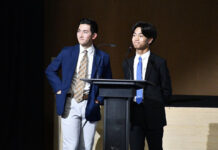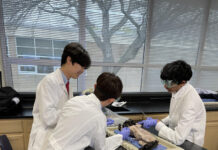The Jesuit Medical Society kicked off this school year with a bang! It not only decided to stay true to its traditional club activities and goals, but also decided to incorporate many surprisingly new prescriptions and goals for its students. In addition, the Medical Society intends to continue helping students develop their profile of the graduate and represent the image of Jesuit College Prep.
Helping students to understand the various healthcare professions in the modern world, the Jesuit Medical Society continues to promote both old club activities and traditions. These activities and traditions are intended to help spread the awareness of the importance of both personal fitness and medicine in today’s society.
For the freshmen in the spring, the Medical Society incorporates weekly cat dissections, which involve the study of anatomy and exposure to conditions of a functioning body. Understanding the physical formula of the domestic cat, students learn about the internals, such as the heart and lungs, in relationship to their own physical makeup. Mr. von Schleheried, physics teacher and moderator of the Jesuit Medical Society, states that the “students improve their intellectual competence through [the cat dissections and] further develop their profile at graduation.”
In addition, juniors have the opportunity to participate in clinical rotations at The Presbyterian Hospital of Dallas. These rotations require the students to directly enter into the field of medicine by observing designated departments in the hospital such as the Gastro-Intestinal Lab or the Cardiac Catheterization Laboratory. In these departments, students experience the atmosphere of the hospital and learn about the tasks of the doctors and nurses in each specific department. From these experiences, the students gain exposure through patient interaction and understanding of the doctor and nurse’s jobs as health care practitioners. For example, Junior Nicholas Petropoulos says that this “[wounderful] opportunity not only enables [him] to experience the work of both doctors and nurses in the medical field, but also to observe if this career is the right path for [him].”
Furthermore, the Medical Society plans to add a new program for the senior students: monthly seminars taught by Dr. Paty Lesczynski. In these lectures, the senior students learn about public health and physical fitness in the ever changing population of the world. Mr. von Schlehenreid also adds that “[this] program is designed for seniors who plan to [pursue] a career in the medical field or for seniors who generally want to understand the public health of [communities and the world].”
As for their goals, the Medical Society will continue to travel to Guatemala and provide Mayan villagers with medications and dental aid. Leaving an impression on the villagers and representing the image of Jesuit, club members share their resources, experience another culture, and alleviate medical problems and health issues in the Atitlan region of Guatemala. Through aiding the sickly, the students plan to represent themselves, helping others first without enjoying the glamour of resorts on the trip. Essentially, the students define themselves as servant leaders, as health care professionals, and as men for others through providing essential health care. Junior William Fiest talked about how his experience “enabled [him] to understand what it means to be a servant leader and empowered him to understand the kindness of giving to others.”
Another goal the club plans to accomplish this year is to incorporate the help of the whole Jesuit community in service to others. The club proposes a method to incorporate Jesuit students who are not part of the society but still want to contribute; this method is the implementation of regular medicine drives. These medicine drives are designed to obtain the necessary items for medical mission trips from the entire Jesuit community.
Every year the Medical Society makes tweaks and amendments to its club to suit the students’ interest through new remedies. The club is getting exponentially bigger as more students join to nourish their medical interests or provide service to others. Students this year should join the Medical Society not only to help the club achieve its goals, but also to partake in an educational and humble experience.






